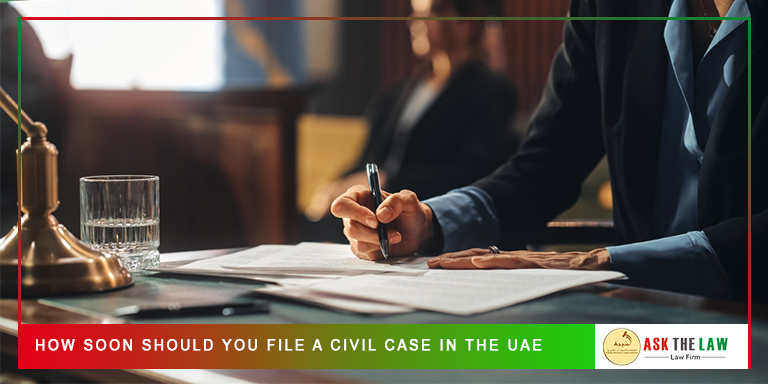
How Soon Should You File a Civil Case in the UAE?
Civil cases are heard with utmost priority in the United Arab Emirates (UAE), especially cases of financial, business and other commercial issues. The statutes of limitations in the UAE define the timeframe for taking legal actions in a timely manner. These deadlines depend on the nature of the case and its laws. The UAE legal system is a blend of Sharia and civil laws; therefore, the UAE courts ensure a practical approach to providing justice and equality to everyone. UAE legal system and judiciary systems, are fully based on practical approach. There is nothing which is not possible to be implemented or unclear for the people.
Definition of Statutes of Limitations
The statutes of limitations play a significant role in dispute resolution. They protect the defendants from prolonged uncertainty. These timeframes are decided under the federal laws known as the civil code. Additionally, specific laws are applied according to the nature of the case.
Timeframe for Civil Cases in the UAE
According to the dispute, the timeframe for civil cases is developed by the UAE courts. We will discuss its details as follows;
- Contracts and Commercial Transactions
Business disputes are common in the UAE since it has become a big business hub. Sometimes, international business practices are applied in the UAE, ensuring fair business dealings worldwide. However, a business dispute should be resolved within 15 years. Cases under the UAE Commercial Transactions Law are usually resolved within 3 years. Please be informed that provided figured can also be wrong or outdated. Therefore, its better to check with our Civil Lawyers.
- Labour Disputes
The UAE has expats working in different organizations. Labour disputes, though not a direct connection with civil case, are related to delayed salaries, unlawful termination, and very little workers’ compensation at the time of accidents. The labour courts in the UAE ensure that cases are resolved within one year from the date they are filed.
- Non-Contractual Disputes
In the UAE, non-contractual disputes relate to property damage or personal injury cases. These are also known as tort claims, and they are resolved within 3 years of the claimant’s making the claim.
- Claims to the Insurance Companies
The claim insurance companies must compensate individuals within 3 years as per the law.
It is always a good approach to consult the lawyers in Dubai.
- Disputes Over Real Estate
In the UAE, claims related to real estate transactions are resolved within 15 years, although the timeline can vary according to the case. Consequently, 10-year-old construction-related claims with structural defects are resolved under the Decennial Liability Rule in the UAE. If the real estate dispute/s is/are converted to a civil case, then civil laws will be applicable rather than land department.
Specific Cases with Different Time Limits?
Despite those time limits as per the UAE civil laws, there are some claims and disputes with specific timeframes:
- Maritime Claims
The UAE has a strategic geographical location where international trade routes have increased the country’s economic growth. However, ship collisions and cargo damage come under maritime claims and are resolved within 2 years. Maritime laws are not easy to be understood. Therefore, it’s better to have a sitting with our Emirati lawyer.
- Banking and Financial Disputes
The banking and financial disputes in the UAE are resolved within 5 years under the Commercial Transactions Law.
- Clinical Negligence Claims
If you have been a victim of malpractice for your medical treatment, you can make your claim against the medical professional. The timeline for the claim is 3 years as soon as the malpractice of medical treatment has happened to the individual.
Timeline for Claims and Compensation
The perfect timeline for the claim and compensation is when the dispute has happened. Why? Claims are resolved within a time limit, and filing a complaint or a dispute could be time-consuming. Each type of claim may have a different set of clocks ticking.
Exceptions and Extensions
The UAE’s legal system is strict to ensure justice and fairness to everyone. Though the statutes of limitations are implemented without a second thought, there are exceptions and extensions in some situations:
- Acknowledgment of Debt
In debt recovery cases, the debtor often accepts their mistake and asks for more time to pay back the debt. Sometimes, they have a written agreement; otherwise, it could be a verbal call. In this situation, the timeline extends, making the creditor wait for their money.
- Force Majeure Incidents
If a catastrophe happens, such as a pandemic or a natural disaster in the UAE, the claim may not be filed on time, which may lead to extending or suspending the limits of compensation.
- Minors and Legal Status of the Individual
If a claim is made for the minor, it cannot be matured unless the minor reaches the age of maturity. However, the minor must have legal status to make the claim in the UAE.
- Claims Related to Government
When it comes to government-related claims, they are usually resolved within a specific timeline because the government takes a proactive approach and works systematically in the UAE. If you are unable to file the civil case, you may not get the compensation that you deserve. The case may be dismissed in the court.
Advice for Claimants
While making claims, the claimants should act responsibly. They should not delay filing the claim and should contact a legal consultant as soon as possible. Moreover, the evidence of correspondence and contract documentation should be available to the claimant. Nevertheless, it is important to know the laws regarding your case so you can know what type of claim you can make and if you still have time to make it to the authorities. One should always seek legal advice before they begin with the claim because the legal experts will protect their client’s interest. You can further meet our lawyers in Dubai with expertise in Civil Law, if you need some case related information or want to learn about federal laws.
Civil Lawyers in the UAECivil Lawyers in the UAE
The UAE legal system has focused on family and employment issues more than any other case because these two things make the country a better place for others. Expats from all over the world learn about business and family values in the UAE. These individuals are guided by legal consultants for their civil cases, such as marriage, divorce, child custody, and employment disputes. Additionally, cases of claims and compensations are also handled by civil lawyers in the UAE.
How Can I Find a Qualified Civil Lawyer?
It is a tedious task to find a qualified civil lawyer in the UAE. To understand the UAE legal system, you will need an experienced and professional legal expert because of the complicated legislation. There are different tactics to find a qualified lawyer for your case. You can begin your search from online sources. Many law firms in the UAE are providing legal services in civil cases. They have multilingual legal experts to cater to a wide range of clients. Your next step is to shortlist a few lawyers and meet them in person to see their confidence in your case. Ask The Law Al Shaiba Advocates and Legal Consultants, provide you the result-driven legal services.
Should I Go for Referrals in the UAE?
The referral system is helpful in many cases, especially when you do not have any idea about your next step. For example, if you need to buy a house in the UAE, you can have a referral from a real estate agent from your friends or family. In the same way, a referral can be shared with you either by a friend or a bar association. One must always get legal services for anything they are doing important in their lives. Without a legal consultation on your case, you could face severe consequences. The UAE laws are stringent; therefore, always hire a lawyer for your case.


